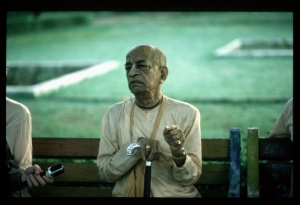SB 9.2.17: Difference between revisions
m (1 revision(s)) |
(Vanibot #0054 edit - transform synonyms into clickable links, which search similar occurrences) |
||
| (One intermediate revision by one other user not shown) | |||
| Line 1: | Line 1: | ||
{{info | {{info | ||
|speaker= | |speaker=Śukadeva Gosvāmī | ||
|listener=King | |listener=King Parīkṣit | ||
}} | }} | ||
[[Category:Srimad-Bhagavatam - Canto 09 Chapter 02]] | |||
[[Category:Bhagavatam Verses Spoken by Sukadeva Gosvami - Vanisource|090217]] | |||
<div style="float:left">'''[[Srimad-Bhagavatam]] - [[SB 9|Ninth Canto]] - [[SB 9.2: The Dynasties of the Sons of Manu|Chapter 2: The Dynasties of the Sons of Manu]]'''</div> | |||
<div style="float:right">[[File:Go-previous.png|link=SB 9.2.16]] '''[[SB 9.2.16]] - [[SB 9.2.18]]''' [[File:Go-next.png|link=SB 9.2.18]]</div> | |||
{{RandomImage}} | |||
==== TEXT 17 ==== | ==== TEXT 17 ==== | ||
<div | <div class="verse"> | ||
dhṛṣṭād dhārṣṭam abhūt kṣatraṁ | :dhṛṣṭād dhārṣṭam abhūt kṣatraṁ | ||
brahma-bhūyaṁ gataṁ kṣitau | :brahma-bhūyaṁ gataṁ kṣitau | ||
nṛgasya vaṁśaḥ sumatir | :nṛgasya vaṁśaḥ sumatir | ||
bhūtajyotis tato vasuḥ | :bhūtajyotis tato vasuḥ | ||
</div> | </div> | ||
| Line 17: | Line 22: | ||
==== SYNONYMS ==== | ==== SYNONYMS ==== | ||
<div | <div class="synonyms"> | ||
''[//vanipedia.org/wiki/Special:VaniSearch?s=dhṛṣṭāt&tab=syno_o&ds=1 dhṛṣṭāt]'' — from Dhṛṣṭa, another son of Manu; ''[//vanipedia.org/wiki/Special:VaniSearch?s=dhārṣṭam&tab=syno_o&ds=1 dhārṣṭam]'' — a caste of the name Dhārṣṭa; ''[//vanipedia.org/wiki/Special:VaniSearch?s=abhūt&tab=syno_o&ds=1 abhūt]'' — was produced; ''[//vanipedia.org/wiki/Special:VaniSearch?s=kṣatram&tab=syno_o&ds=1 kṣatram]'' — belonging to the ''kṣatriya'' group; ''[//vanipedia.org/wiki/Special:VaniSearch?s=brahma&tab=syno_o&ds=1 brahma]-[//vanipedia.org/wiki/Special:VaniSearch?s=bhūyam&tab=syno_o&ds=1 bhūyam]'' — the position of ''brāhmaṇas''; ''[//vanipedia.org/wiki/Special:VaniSearch?s=gatam&tab=syno_o&ds=1 gatam]'' — had achieved; ''[//vanipedia.org/wiki/Special:VaniSearch?s=kṣitau&tab=syno_o&ds=1 kṣitau]'' — on the surface of the world; ''[//vanipedia.org/wiki/Special:VaniSearch?s=nṛgasya&tab=syno_o&ds=1 nṛgasya]'' — of Nṛga, another son of Manu; ''[//vanipedia.org/wiki/Special:VaniSearch?s=vaṁśaḥ&tab=syno_o&ds=1 vaṁśaḥ]'' — the dynasty; ''[//vanipedia.org/wiki/Special:VaniSearch?s=sumatiḥ&tab=syno_o&ds=1 sumatiḥ]'' — of the name Sumati; ''[//vanipedia.org/wiki/Special:VaniSearch?s=bhūtajyotiḥ&tab=syno_o&ds=1 bhūtajyotiḥ]'' — of the name Bhūtajyoti; ''[//vanipedia.org/wiki/Special:VaniSearch?s=tataḥ&tab=syno_o&ds=1 tataḥ]'' — thereafter; ''[//vanipedia.org/wiki/Special:VaniSearch?s=vasuḥ&tab=syno_o&ds=1 vasuḥ]'' — by the name Vasu. | |||
</div> | </div> | ||
| Line 24: | Line 29: | ||
==== TRANSLATION ==== | ==== TRANSLATION ==== | ||
<div | <div class="translation"> | ||
From the son of Manu named Dhṛṣṭa came a kṣatriya caste called Dhārṣṭa, whose members achieved the position of brāhmaṇas in this world. Then, from the son of Manu named Nṛga came Sumati. From Sumati came Bhūtajyoti, and from Bhūtajyoti came Vasu. | From the son of Manu named Dhṛṣṭa came a kṣatriya caste called Dhārṣṭa, whose members achieved the position of brāhmaṇas in this world. Then, from the son of Manu named Nṛga came Sumati. From Sumati came Bhūtajyoti, and from Bhūtajyoti came Vasu. | ||
</div> | </div> | ||
| Line 31: | Line 36: | ||
==== PURPORT ==== | ==== PURPORT ==== | ||
<div | <div class="purport"> | ||
Here it is said, kṣatraṁ brahma-bhūyaṁ gataṁ kṣitau: although the Dhārṣṭas belonged to the kṣatriya caste, they were able to convert themselves into brāhmaṇas. This gives clear evidence supporting the following statement by Nārada ([[SB 7.11.35]]): | Here it is said, ''kṣatraṁ brahma-bhūyaṁ gataṁ kṣitau:'' although the Dhārṣṭas belonged to the ''kṣatriya'' caste, they were able to convert themselves into ''brāhmaṇas''. This gives clear evidence supporting the following statement by Nārada ([[SB 7.11.35]]): | ||
:yasya yal lakṣaṇaṁ proktaṁ | :''yasya yal lakṣaṇaṁ proktaṁ'' | ||
:puṁso varṇābhivyañjakam | :''puṁso varṇābhivyañjakam'' | ||
:yad anyatrāpi dṛśyeta | :''yad anyatrāpi dṛśyeta'' | ||
:tat tenaiva vinirdiśet | :''tat tenaiva vinirdiśet'' | ||
If the qualities of one group are found in the men of another, those men should be recognized by their qualities, by their symptoms, not by the caste of the family in which they were born. Birth is not at all important; it is one's qualities that are stressed in all Vedic literature. | If the qualities of one group are found in the men of another, those men should be recognized by their qualities, by their symptoms, not by the caste of the family in which they were born. Birth is not at all important; it is one's qualities that are stressed in all Vedic literature. | ||
</div> | </div> | ||
__NOTOC__ | |||
<div style="float:right; clear:both;">[[File:Go-previous.png|link=SB 9.2.16]] '''[[SB 9.2.16]] - [[SB 9.2.18]]''' [[File:Go-next.png|link=SB 9.2.18]]</div> | |||
__NOTOC__ | |||
__NOEDITSECTION__ | |||
Latest revision as of 23:50, 18 February 2024

A.C. Bhaktivedanta Swami Prabhupada
TEXT 17
- dhṛṣṭād dhārṣṭam abhūt kṣatraṁ
- brahma-bhūyaṁ gataṁ kṣitau
- nṛgasya vaṁśaḥ sumatir
- bhūtajyotis tato vasuḥ
SYNONYMS
dhṛṣṭāt — from Dhṛṣṭa, another son of Manu; dhārṣṭam — a caste of the name Dhārṣṭa; abhūt — was produced; kṣatram — belonging to the kṣatriya group; brahma-bhūyam — the position of brāhmaṇas; gatam — had achieved; kṣitau — on the surface of the world; nṛgasya — of Nṛga, another son of Manu; vaṁśaḥ — the dynasty; sumatiḥ — of the name Sumati; bhūtajyotiḥ — of the name Bhūtajyoti; tataḥ — thereafter; vasuḥ — by the name Vasu.
TRANSLATION
From the son of Manu named Dhṛṣṭa came a kṣatriya caste called Dhārṣṭa, whose members achieved the position of brāhmaṇas in this world. Then, from the son of Manu named Nṛga came Sumati. From Sumati came Bhūtajyoti, and from Bhūtajyoti came Vasu.
PURPORT
Here it is said, kṣatraṁ brahma-bhūyaṁ gataṁ kṣitau: although the Dhārṣṭas belonged to the kṣatriya caste, they were able to convert themselves into brāhmaṇas. This gives clear evidence supporting the following statement by Nārada (SB 7.11.35):
- yasya yal lakṣaṇaṁ proktaṁ
- puṁso varṇābhivyañjakam
- yad anyatrāpi dṛśyeta
- tat tenaiva vinirdiśet
If the qualities of one group are found in the men of another, those men should be recognized by their qualities, by their symptoms, not by the caste of the family in which they were born. Birth is not at all important; it is one's qualities that are stressed in all Vedic literature.